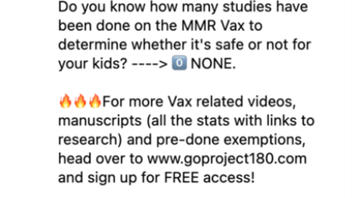STORY UPDATED: check for updates below.

Did a study find that vaccination for measles, mumps and rubella (MMR) causes an increased likelihood of asthma and eczema? No, that's not true: The study authors did not come up with that conclusion. They said, "Our data suggest that currently recommended routine vaccinations are not a risk factor for asthma or eczema."
The claim appeared in a post and video (archived here) on Instagram by dr.stevenbaker on February 19, 2024. The post's caption said:
Is the MMR jab safe?!
Do you know how many studies have been done on the MMR Vax to determine whether it's safe or not for your kids? ----> 0️⃣ NONE.
🔥🔥🔥For more Vax related videos, manuscripts (all the stats with links to research) and pre-done exemptions, head over to www.goproject180.com and sign up for FREE access!
Please like, comment, share and save to help boost the algorithms and help spread truth about V's to more people! 🙌
Disclaimer:
Dr Baker is a chiropractor who does his own research to find out the truth behind waxxines and shares with you so you can protect your kids.....Unlike your pediatrician who is just making a quick buck by convincing you to poison your kids....
This is how the post appeared on Instagram at the time of writing:
(Source: Instagram screenshot taken on Tue Feb 20 16:48:17 2024 UTC)
The video
The man in the video is Steven Baker. He's a doctor of chiropractic, not a medical doctor. During the two-minute 45-second video, he cites a 2004 research paper (archived here) titled "Vaccination and Allergic Disease: A Birth Cohort Study." Baker makes several claims during the clip, but in this fact check, we will only address those involving asthma and eczema.
About 18 seconds into the video, Baker said this about the two allergic diseases:
They looked at health records of 29,238 kids. And what they found was that children who had received the MMR vaccine were 3.5 times more likely to have asthma and 4.6 times more likely to have eczema than kids who were not vaccinated at all.
The study involved children ages 0 to 11 in the West Midlands of central England. While the raw numbers are correct, the authors of the paper came to a different conclusion once they had considered all factors. The study said:
Results. We found an association between vaccination and the development of allergic disease; however, this association was present only among children with the fewest physician visits and can be explained by this factor.
Conclusions. Our data suggest that currently recommended routine vaccinations are not a risk factor for asthma or eczema.
In the "Discussion" section of the study, the authors added:
[W]hen we examined the impact of vaccination, consulting frequency was a major consideration. Children who are not taken to the doctor are less likely to be vaccinated and also have less of an opportunity to have a diagnosis of allergic disease recorded. Our data are in keeping with the ascertainment bias, showing the impact of vaccination occurs only in children who rarely consult a physician.
There is inconsistent evidence for a relation between vaccination and the development of allergic disease. Because most children are vaccinated, and therefore do not develop allergic disease, it is difficult to obtain numbers adequate to examine the vaccination-allergic disease relationship, and unvaccinated children are a highly selected and probably atypical group.
Dr. David Kimberlin, an infectious disease expert with the American Academy of Pediatrics Council on Infectious Disease, told Lead Stories in a February 21, 2024, email that he concurs with Lead Stories' interpretation of the study. He said:
The online 'report' claims the exact opposite of what the actual study found. ... DTaP [diphtheria, tetanus, pertussis] and MMR vaccines are very safe and very effective. They have saved countless lives over the decades.
Centers for Disease Control and Prevention
In a February 21, 2024, email to Lead Stories, the Immunization Safety Office at the Centers for Disease Control and Prevention said the study's conclusions mirror its findings. The CDC's response continued:
CDC has detected no unusual or unexpected reporting patterns of asthma or eczema following childhood immunization that would indicate vaccines cause asthma or eczema.
On-time vaccination throughout childhood is essential because it helps provide immunity before children are exposed to potentially life-threatening diseases. Immunity is the body's way of preventing disease. Because a baby's immune system is not fully developed at birth, babies face a greater risk of becoming infected and getting seriously ill. Vaccines help teach the immune system to learn how to defend against germs. Vaccination protects your child by helping build up their natural defenses.
Prior to licensure, double blind clinical trials are conducted in which either vaccines or placebos are given to subjects without the vaccine recipient or the person performing the research knowing which was given. Vaccine recipients in both groups are monitored afterwards to determine if there is a difference in the rates of adverse events among the two groups. After licensure, surveillance for adverse events after vaccine receipt is ongoing, and studies are also conducted to continually monitor vaccine safety. ...
In summary, vaccines are recommended for babies, children, and adults because vaccines save lives, and the benefits of vaccinations far outweigh the risks.
Food and Drug Administration
Cherie Duvall-Jones, a press officer at the Food and Drug Administration (FDA), provided the agency's response to the claim on Instagram. A February 23, 2024, email said: "The Measles, Mumps and Rubella (MMR) Virus Vaccine has not been shown to increase the likelihood of developing asthma and eczema." The statement continued:
This post is one example of factually inaccurate information about vaccines that has circulated in social media. In fact, vaccines are among the safest and most effective public health measures ever introduced and are directly responsible for reducing suffering and saving innumerable lives around the world. Thanks to safe and effective vaccines, we no longer routinely see the serious diseases that they prevent. For example, measles kills at least one in every 1,000 children infected with the virus. The measles vaccine is at least 96 percent effective in preventing illness, and tens of millions of children's lives have been saved across the globe since the vaccine became widely available.
Additional information on the vaccines is available at these links:
- Measles, Mumps and Rubella Virus Vaccine Live
- PROQUAD
- PRIORIX
- Safety Information for Measles, Mumps, Rubella (MMR) Vaccines
Read more
Additional Lead Stories fact checks of claims about vaccines can be found here.
Updates:
-
2024-02-26T23:26:21Z 2024-02-26T23:26:21Z Adds context from the U.S. Food and Drug Administration. -
2024-02-21T22:03:24Z 2024-02-21T22:03:24Z Adds context from the Immunization Safety Office at the Centers for Disease Control and Prevention. -
2024-02-21T17:45:00Z 2024-02-21T17:45:00Z Adds context from Dr. David Kimberlin.


















